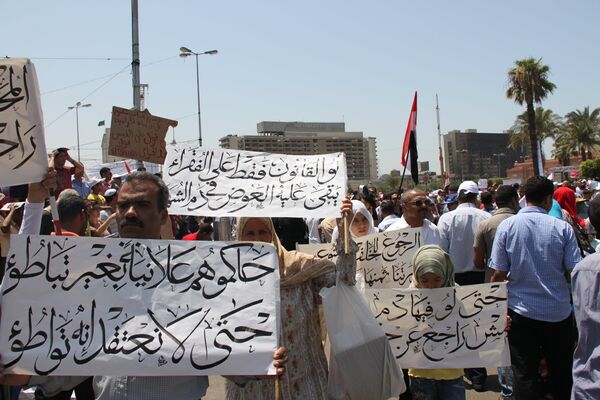Egyptian Prime Minister Essam Sharaf is expected to announce the dismissal of several ministers and some of his deputies today, although protesters on Cairo's Tahrir Square demanded more. They chanted for the resignation of Sharaf himself and Field Marshal Mohammed Hussein Tantawi, who leads the ruling military council.
Salaries are low, rich sent to prison
Egyptians want the revolution to continue. Little has changed in their lives over the past six months since the revolution began. Unlike the public unrest, their salaries and pensions have not grown, which is why the people are chanting for an increased minimum wage of at least $250, which is nearly double the present level.
The population density is extremely high in some regions of Egypt, which has a total population of some 80 million people. The crime and unemployment rates have also been rising. The incomes of the richest Egyptians were once 20 times larger than the incomes of the poor, and this gap has only widened. The only positive development is that some of the rich have been thrown behind bars.
President Hosni Mubarak, who was overthrown in February, and his two sons are in prison awaiting trial on Aug. 3. Egypt's supreme judge announced yesterday that the trial of the 83-year-old politician would be held in a large room to accommodate as many people as possible and broadcast on screens mounted outside the court.
Mubarak led the country for 30 years and waged several wars against Israel, but this will not save him from public wrath. Some think his trial should be broadcast by state television and held in a stadium so that more people can attend.
Ex-ministers to be called into account
On July 12, former Prime Minister Ahmed Nazif was sentenced to a one-year suspended sentence and former Interior Minister Habib al-Adli was given five years for graft. Al-Adli has also been charged with ordering the use of force to disperse demonstrations this January and February.
The police action was said to have claimed about 500 lives. However, the latest estimate is that there were more than 840 victims. This means al-Adli may be sentenced to life in prison or capital punishment. The next hearing will likely be held on July 25.
Former Finance Minister Youssef Boutros-Ghali, who is being tried in absentia, received 10 years.
The three defendants have also been fined for squandering public funds, profiteering and money laundering.
There are also other trials underway. In particular, former Information Minister Anas el-Fiqqi, whom I remember as a smart and exquisitely dressed man with a sense of humor, was absolved of misappropriating public funds on July 5. But he is still on trial for the alleged embezzlement of funds allocated for radio and television development.
It is rumored that he was given about $5 million to ensure that government media provided "correct" coverage of the parliamentary race in late 2010. During the election, the people obediently voted for the ruling National Democratic Party, but this was the last straw that broke the camel's back. Suspicion of rigged elections was one reason why the Egyptians revolted barely a month afterward.
Elections or Constitution?
The revolution has seemingly ended, but has it brought justice to the people? First of all, Egyptians want justice in the distribution of wealth and social boons. They also want revenge and the generals seem to be ready to comply with this demand.
Ensuring a fair distribution of wealth in this poor country is a bigger problem. Revolutions don't create, but rather destroy, and the new authorities have not yet taken the path of creation.
As often happens during revolutions, the revolutionary forces and their supporters united to overthrow the regime, but soon after quarreled about the country's future. Leading Egyptian politicians cannot agree on what should come first -parliamentary elections or the new Constitution.
The Islamists, especially the well-organized Muslim Brotherhood, who are already prepared for the elections, demand that the Constitution be drafted after the elections, which they say should be held in September.
Others think the elections should be postponed for a month or two. The military council will continue to rule the country during this transition period, while a group of approved lawyers will draft amendments to the Constitution to ensure subsequent elections.
The latter scenario better suits the new revolutionary parties and the ruling military council, which will retain power until the elections.
It is strange that the country, which badly needs a breakthrough, cannot make the decision however difficult it may be. Seeking to preserve unity, protesters on Tahrir Square have advanced a new slogan: "The revolution goes on!"
Young people in a tent city at the center of the square are no longer satisfied with the interim government's promises of reform. They want real action.
Yelena Suponina is a political commentator for The Moscow News and a Middle East expert.
The views expressed in this article are the author's and may not necessarily represent those of RIA Novosti.



